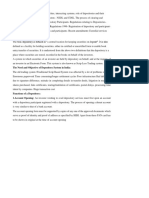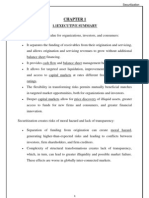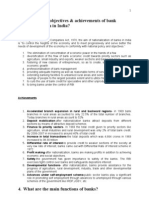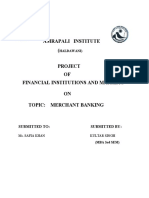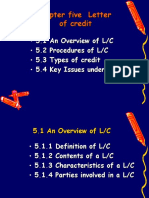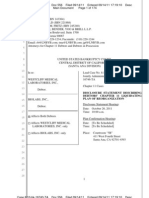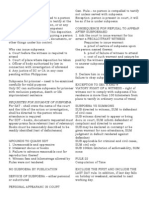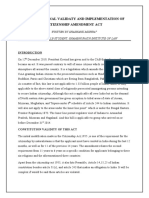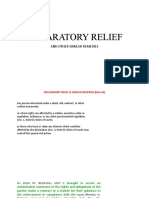Banking Law Assignment - Viswanathan
Uploaded by
Viswa NathanBanking Law Assignment - Viswanathan
Uploaded by
Viswa NathanBanking law assignment
1.DEFINITION OF BANKER:
According to Dr. Herbert L. Hart, Law of banking says “A banker is one who, in the ordinary course
of his business, honour cheques drawn upon him by person from and whom he received money on
current
accounts”
According to this definition, the essential function to enable a person or firm or institution to be
regarded as a banker or bank is that of receiving current deposits against which cheque may be drawn
FUNCTIONS OF BANKER:
1) Agency services
2) Other general utility services
DEFINITION OF CUSTOMER:
The term “customer” of a bank has not been defined by any law. As per the views of Sir John Paget,
“to constitute a customer there must be same recognisable course of habit of dealing in the nature of
regular
banking business.
Mr. Justice Bailhache Dserved:
“ A person become a customer of a bank when he goes to the bank with money or a cheque and asks
to have an account opened in his name and the bank accept the money or cheque and is prepared to
open an
account in the name of that he is entitled be called a customer of the bank.”
RELATION
RELATION BETWEEN BANKER AND CUSTOMER:
Banker-customer relation
A) General relationship B) Special relationship
i) Debtor and creditor i) Bailor and Bailee
ii) Principle and agent
iii) Trustee and beneficiary
iv) Banker as advisor
v) Other relation
A. GENERAL RELATIONSHIP
I) Debtor and Creditor Relationship:
The relationship between a banker and his customer is mainly that of debtor and creditor
Sir, John, Paget, Remarks:” the relation of a banker and customers primarily that of debtor and
creditor, the
respective position being determined by the existing state of the account.”
But, when the account is over drown, the roles are changed. The banker being a creditor and the
customer the debtor. A depositor is an unsecured creditor as he has charge over assets of his
banker.
But when a loan is granted to him by a banker on some securities, the banker becomes a secured
creditor of
his customer
Peculiarities industrilalities: (debtor – creditor relationship)
1. Not time –barred
The deposited with the bank does not become time- Barred on the expiry of three years. On the
other hand
An ordinary debt becomes a time bared debt after the expiry of three years.
2. Creditor must demand payment:
The customer who has deposited money in the bank (debtor) must ask the bank to money.
But in the case of debt due from a banker, demand for the payment, is nessccsary.
3. Proper place and time of demand:
The bank accepts money on a current account, its promises to honour its customer’s cheques so
for as
the amount is sufficient and available in other words, a customer can issue cheques on the branch
of the bank
where the account is kept. The amount should have to repay during banking hours.
4. Demand to be made in proper manner:
Deposits are withdraw able by cheques draft and order otherwise .Demand for refund must be
made
by means of cheque or order as permitted by the banker. The amount should never be returned on
oral
instruction
B) SPECIAL RELATIONS
1. Bailor and Bailee Relationship:
The bank becomes a Bailee on case of the valuable or securities deposited with him for safe
custody
and it must have to re-deliver the same goods to the bailor along with any profit or surplus that
might have
accrued from the goods so bailed.
It is to be noted that money deposited with the bank is not the subject matter of bailment because
the
banks do not pay the same coins or notes deposited. Nor are they liable to surrender to the
customers any profit
made by them from utilisation of money so deposited.
2. Principal and Agent:
A banker also acts as an agent of his customer and performs a number of agency functions like
collect
cheques, bills, interest, etc. And pay insurance premium on behalf of their customers some banks
have
established tax services department to take up the tax problems of the customers.
3. Trustee and Beneficiary:
When the banker acts as a trustee with regard to securities and valuable deposited for safe
custody .The
funds or assets coming into his hands in the capacity of a trustee must be applied only for the
specific purpose.
4. Banker as Agent and Advisor:
When the banker buys or sells securities on behalf of his customer and renders other services,he
is
acting as an agent of his customer.
5. Other Services:
The banker is a lessor, when he lets out safe deposits lockers. When the bank undertakes to
render
advice to corporate customers on financial matters and to manage their new capital issues, he
acts as a manager
to the issue.
SPECIAL FEATURES OF BANKER-CUSTOMER RELATIONSHIP:
A. Rights
i) Bankers Rights of General Lien:
Lien means the right of the creditor to retain the goods and securities owned by the debtor until
the
debt due from him is paid lien may be either
i) Particular Lien
ii) Genetal Lien
i) Particular Lien:
Particular lien confers upon the creditor the right to retain the particular security offered for the
particular debt.
ii) General Lien:
General lien denotes the right of a creditors to retain any goods and securities bailed to him for a
general balance of account since the banker has got a general lien he can retain all the articles
belonging to
customer until the whole amount due to him has been repaid
No Agreement is necessary for creation of lien:
No Agreement is necessary for creation of lien under the Indian Law.
Conditions to be satisfied for Exercising Lien:
a) The securities should have been deposited with the banker to grant loan.
b) The securities should not have been entrusted to him for a special purpose
E.g. Once Loan is repaid, the customer can take away the security
c) The lien does not arise in respect of documents or valuables left with the banker
d) The possession of securities must have been lawfully obtained in his capacity as banker
e) There should be no agreement inconsistent with lien.
f) The lien arises only in respect of articles belonging to the customer in same capacity
g) The banker cannot exercise his lien over the securities of the customers in respect of the
amounts
that may become due to him on a future date.
h)It has been decided that a Banker can exercise his lien even in respect of on securities
deposited
with him in respect of which he has the right to collect interest by filing in the coupons
i) A Banker can exercise his line even in respect of securities deposited with him for which have
become time - barred
Exemption to the right of lien:
a) If the goods and securities, have been entrusted to him as a Trustee or as agent of the
customer, the
banker cannot climb the right of lien on those properties.
b) When a customer send a check are able with clear instructions to utilise for specific purpose,
the
banker cannot exercise the right of lien.
c) When some securities are left with the banker by mistake, he cannot exercise the right of lien.
d) The banker has no lien on the credit balance in the personal account of partner or partnership.
2. Bankers right to set off:
The right to combine or set off accounts implies the right of a debtor to adjust a Debt owed to
him by
his creditor.
E.g.: A’s credit balance cannot be set off against the joint Debt of A and B unless
i) A has expressly agreed that it can be done or
ii) A and B Have agreed to the both jointly and severally responsible for the debt in their joint
name.
Conditions to be fulfilled to set-off
1) Both the accounts of the customer must be in the same name and in the same right.
2) A Debit balance in a personal account cannot be set off against the credit balance in the trust
account as in
name of the customer.
3) The right of setoff can be exercised only against Dept due on the date and not against a future
date.
4) The amount of debts must be certain
5) The right of setoff is available to the banker only if there is no agreement to the contrary.
3. Right of appropriation:
The right of a Banker to appropriate the money paid by the customer to any one of loans
including at
time-barred debt. Once the customer give specific direction regarding appropriation, the banker
has no right
to alter them in the absence of such direction from customer, the banker shall have the right to
appropriate the
payment to any Debt.
4. Law of limitation:
A debt become time barred if it is not repaid within 3 years after it is contracted.no action
can be brought against the debtor in respect of the money due by him after the expiry of three
years from the
time of the Debt.
5. Bankers right to charge compound interest:
Banker has the right to share interest on loans and advances granted to his customers. Banka
charge
interest every half year but they can charge compound interest unless there is an agreement
6. Bankers right to climb incidental charge on un-remunerative accounts:
The relation of a Banker and customer accept the banker has an implied right to climb
commissions,
interest and other incidental charges for the securities rendered to the customer.
Obligations:
1. Obligation to honour cheques:
Obligations of the banker to honour the cheque of the customer in a statutory obligation
i) The drawee of cheque, having sufficient funds of the draweer in his hand
ii) The applications may be extended by an agreement, express are implied to the account of
overdraft
agreed upon. In the absence of an overdraft, the banker can dishonoured cheque
iii) Sometimes a customer Mein deposit cheque and bill for collection and credit to his account.
He
made a check on the banker in anticipation of such collection.
2. Application to maintain secrecy:
The banking company should not disclose matters relating to the customer’s account expect
on reasonable and proper occasions.
Disclosure must be under certain occasion such as
Disclose under compulsion of law in case of Discovery and inspection comparing the
production of books of accounts and other documents, etc.
Disclosure as duty to the public:
E g: If a customer is trading with Enemies country during times of War, the banker must disclose
interest to the public.
Disclosure and interest of bank in case when a customer fails to pay money due to the bank, the
banker
has to file a suit for recovery of the debt.
Disclosure on Express or implied consent of the customer E.g.: customer directs the banker to
intimate
the balance in his account to an agent or employee.
3. Obligations not to close the amount of the customer without prior notice.
The banker must close the account with prior sufficient notice in written information requesting
the
customer to withdraw his balance
2.
special features of RBI
The Reserve Bank of India performs all Central banking functions
i) Sole authority of issuing of currency in that country not only new currency but also regulate
the issue of currency in India.
ii) Regulate and control money supply in the country.
iii) The Reserve Bank of India Act as a Banker to the commercial banks by keeping and
maintaining their accounts just like the private individuals.
iv) Acts as a lender to commercial banks.
v) The RBI acts as a Banker to both the central government and also the state government the
RBI not only looks after the financial transactions of the government but also main is the public
Dept
of the government.
vi) In order to maintain price stability, the RBI exercises its control over the volume of credit
created by the commercial banks.
vii) The RBI has the responsibility of maintaining the external value of the Indian Rupee just
like maintaining the internal value of the currency.
viii) RBI concern with the development of rural banking, Financial Institutions and
development of capital and money market in India.
ix) Promotional measures by RBI
RBI established the Bill market scheme in 1952.
RBI has helped to establish Financial Institutions to provide credit to the agricultural
and industrial sector of the economy.
Establishment of regional rural banks.
Helps commercial banks open branches in foreign countries.
RBI encourages and promotes research in the area of Banking
1. The RBI and the state-run security printing and minting crop are both working to introduce
the revised number pattern in currency notes
2. The RBI also asked the banks to stamp notes detected as fake as “counterfeit note”
3. The RBI also orders the banks to check the menace of fake Indian currency new notes,
especially, the rupees thousand rupees 500 denomination.
4. If a bank official found any fake notes, he should file and register FIR against the person
who give the note. If sales, the RBI will penalise the bank.
Banking Regulation Act 1949(an act to consolidate and amend the law relating to banking)
Before passing this act the banking business governed by the Indian companies act 1913
Since banking as a business has its own distinctive features, it fails necessary to have separate
at. So Banking Regulation Act 1949 was passed in February 1949. This act was amended in 1965
to
make it applicable to cooperative banks and to employment other changes
You might also like
- Alternate Source of Finance, Private and Social Cost-Benefit, Public Private PartnershipNo ratings yetAlternate Source of Finance, Private and Social Cost-Benefit, Public Private Partnership20 pages
- Necessity To Determine Relationship Between Banker and CustomerNo ratings yetNecessity To Determine Relationship Between Banker and Customer3 pages
- Relationship Between Banker and CustomerNo ratings yetRelationship Between Banker and Customer9 pages
- The General Relationship Between Bank and Its Customer100% (1)The General Relationship Between Bank and Its Customer9 pages
- Asset Backed Securitization in BangladeshNo ratings yetAsset Backed Securitization in Bangladesh22 pages
- Laws and Practice of General Banking (LPGB) (1st Class) For 99th Batch ABCLITNo ratings yetLaws and Practice of General Banking (LPGB) (1st Class) For 99th Batch ABCLIT8 pages
- What Are The Objectives & Achievements of Bank Nationalization in India?No ratings yetWhat Are The Objectives & Achievements of Bank Nationalization in India?32 pages
- Banking Laws Pakistan Negotiable Instruments100% (8)Banking Laws Pakistan Negotiable Instruments57 pages
- Foreign Exchange Market Dynamics, Participants and Transaction MethodsNo ratings yetForeign Exchange Market Dynamics, Participants and Transaction Methods33 pages
- International Settlement Letter of CreditNo ratings yetInternational Settlement Letter of Credit80 pages
- Marjon A. Limot October 7, 2020 Bsba-3B TTH (5:30Pm-7:00Pm) Fm130:Monetary Policy and Banking Prof: Maam Erlinda J. Diasemen Assignment No.2No ratings yetMarjon A. Limot October 7, 2020 Bsba-3B TTH (5:30Pm-7:00Pm) Fm130:Monetary Policy and Banking Prof: Maam Erlinda J. Diasemen Assignment No.22 pages
- Banking Important Exam Question and TermsNo ratings yetBanking Important Exam Question and Terms3 pages
- JPMAC2006-NC1 Schedule D To The Master ISDA Agreement100% (1)JPMAC2006-NC1 Schedule D To The Master ISDA Agreement38 pages
- Insurance Regulatory and Development Authority of India (IRDA)No ratings yetInsurance Regulatory and Development Authority of India (IRDA)2 pages
- What Is An 'Unsponsored ADR': American Depositary Receipt (ADR) Issuer Sponsored ADR Voting RightsNo ratings yetWhat Is An 'Unsponsored ADR': American Depositary Receipt (ADR) Issuer Sponsored ADR Voting Rights8 pages
- Affidavit of Explanation and UndertakingNo ratings yetAffidavit of Explanation and Undertaking1 page
- Describe The Principles of General International LawNo ratings yetDescribe The Principles of General International Law2 pages
- Case Brief .Consolidated Petition No. 38 of 2014. (2022 Judgement)No ratings yetCase Brief .Consolidated Petition No. 38 of 2014. (2022 Judgement)3 pages
- Chapter 6 - Rights & Protection of MinorityNo ratings yetChapter 6 - Rights & Protection of Minority49 pages
- Regional Trial Court: Hall of Justice, Surigao CityNo ratings yetRegional Trial Court: Hall of Justice, Surigao City10 pages
- MILSHS q1 Mod7 EditedLanguage LegalandEthicalIssuesInMediaandInformation - V4.A100% (2)MILSHS q1 Mod7 EditedLanguage LegalandEthicalIssuesInMediaandInformation - V4.A19 pages
- SWORN DECLARATION OF RELATIVES IN BUKIDNON STATE UNIVERSITYNo ratings yetSWORN DECLARATION OF RELATIVES IN BUKIDNON STATE UNIVERSITY1 page
- State v. Craig, Brief For The State, New Hampshire Supreme CourtNo ratings yetState v. Craig, Brief For The State, New Hampshire Supreme Court21 pages
- DIGEST - The Insular Life Assurance Company, Ltd. vs. KhuNo ratings yetDIGEST - The Insular Life Assurance Company, Ltd. vs. Khu3 pages
- R63 Declaratory Relief and Similar Remedies100% (2)R63 Declaratory Relief and Similar Remedies15 pages















